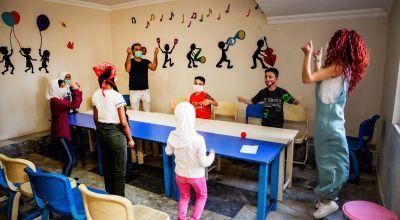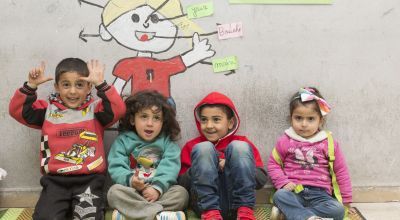
Read our 2024 annual report

Knowledge Hub
Over the last decade-plus, it has become increasingly recognised that education is urgently needed to prevent Syrian refugee children from becoming a “lost generation.”
However, in two of the largest host communities for Syrians, there are many barriers to education.
According to the UNHCR, there are currently some 488,000 school-aged Syrian children in Lebanon, more than half of whom are not in the classroom. Many Syrian children living in Turkey have now missed four or more years of education, and as of the 2020/21 academic year, more than 35% the 1.1 million school-aged Syrian children in Turkey remained out of school with no access to educational opportunities. UNICEF estimated an additional 80,000 teachers would need to be recruited to accommodate those out of school.
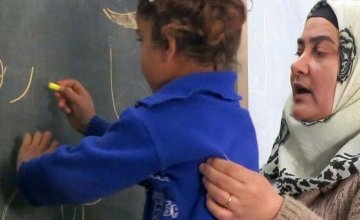
Why education for refugees matters
When working with refugees, education often slips down the list of priorities in the stead of other life-saving actions like basic shelter and sanitation. However, Concern believes that providing children with the opportunity to return to school is a crucial part of normalising life after a crisis and addressing the psychosocial impacts of war.
There are a few other key reasons that education is so important: According to UNESCO, if all students in low-income countries had just basic reading skills - nothing else -, an estimated 171 million people could escape extreme poverty. If all adults completed secondary education, we could cut the global poverty rate by more than half. With over 80% of Syrians now living below the poverty line and a long road to recovery when the war ultimately ends, education will be one of the country’s greatest assets for rebuilding the country’s infrastructure and maintaining peace.
Education is also known to decrease risks that many refugee families can face, including:
- Teenage pregnancy and maternal mortality rates
- Vulnerability to natural disasters and climate change
- Vulnerability to public health crises (such as HIV/AIDS)
- Domestic and intimate partner violence rates
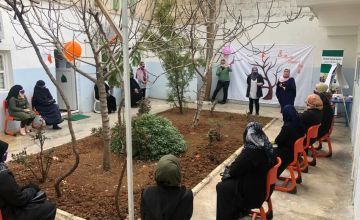
Back to school is easier said than done
Going back to school gives youngsters a routine, the chance to play with others and just be normal children. Still, that can be a challenge for children who have experienced the horrors of war. Syrian teacher Abdul Hussain*, who works at a temporary education centre (TEC) in Turkey, says most of the Syrian children attending have some kind of psychological problem because of what they’d been through back home.
“You always feel that children are somehow absent, and lack attention, like something is missing. Any unusual loud sound they hear, which they think is a bullet or a bombing, they start screaming and show a very unusual fear…you have to realise, they are still young children.”
This is why education for refugee children is an even more delicate endeavour. While most teachers have some grounding in psychology, teachers for refugee communities need to understand the effects of PTSD and be able to adjust their approaches accordingly.
Learning loss is also hugely problematic for young Syrian children who have missed up to three years of education as a result of the protracted and ongoing conflict. Many of them have faced considerable upheaval and turmoil in their young lives and have missed out on the fundamentals of literacy and numeracy.
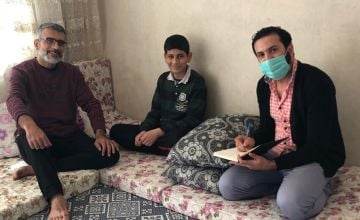
Other barriers to education for Syrian refugee children
Beyond the psychological considerations, a few other challenges remain between refugee children and the education they deserve. These can include:
- Language barriers (even Arabic has several different dialects depending on which country you’re in)
- Costs including school supplies, uniforms and transportation
- Overcrowding in classrooms and limited opportunities in certain areas
- Other financial constraints that force children to join the workforce
That final point is one we’ve seen often at Concern over the last eight years of our work in Syria, Turkey and Lebanon. Some students spend many hours before and after school working to earn money for their families, a dual-existence that forces them to grow up very quickly. When we met Mustafa* in 2015, neither of his parents were able to work — his father has cardiac problems and his mother suffers severe asthma. So Mustafa, along with his older siblings, took on the responsibility of supporting his family, cleaning tables and washing dishes in a café every day from 10am to midnight. The €5 per day he earned went to his family’s rent and even during the school year, he was between the classroom and the café.
Yet Mustafa was still marginally lucky; despite the gruelling hours and workload, he was still attending school in between shifts. Many children opt out of education, or are opted out by their parents. This alarms Syrian teacher Farah*: “If children don’t go to school, we are going to have a very bad future and a lost generation.”
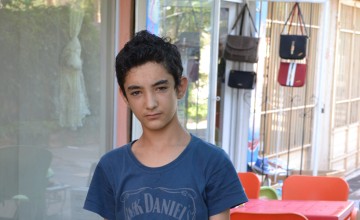
Educating Syrian children in Lebanon…
For many months, all of Neda’s* thoughts were of war. As an 11-year-old refugee living with her mother and younger brother in northern Lebanon, her days were a patchwork of competing emptiness, loss, sorrow, and fears about her father, imprisoned in Syria.
Concern Worldwide began an informal education programme in Lebanon, gathering children in tents, offering them the chance to learn, read, write, draw, and — most important — to laugh. Now Neda wakes up early, lives for her schoolwork and dreams of becoming a doctor. Her mother, 32-year-old Ameera*, is more circumspect, knowing a refugee child will face many barriers on the way to a professional career. “I can’t help but worry that she will be disappointed,” says Ameera as she offered guests bread with oil and za’atar. “At the same time, I’m so glad she has dreams. All we know about my husband is rumours, and my children miss him."
In Lebanon, the government opened public schools to Syrian children, but language barriers, overcrowding and the cost of transportation keep many refugee children out of school. Concern began responding in Lebanon in 2013, and supported the education of over 1,850 students in 25 learning spaces, as well as the career training for Lebanese and Syrian facilitators to help teach the children. Additionally, Concern was selected by UNICEF to run a homework support programme that includes 2,550 students, both Lebanese and Syrian, in 12 learning spaces, including three public schools.
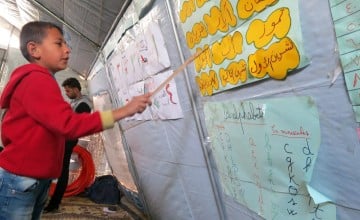
…as well as teachers
It is not only the children but also the facilitators who gained from the informal education programme. Aya, 25, always dreamt of being a teacher. But when she married at age 19 and had her first child within that year, her dreams seemed unlikely. She was the mother of an infant and a toddler when the Syrian war engulfed her neighbourhood.
First her father was imprisoned. Then, “two bombs hit the house next door, killing all the children inside,” she said. Death at her doorstep was the last straw. “We got on a bus with others who were fleeing. The driver drove fast, like a crazy man, but it still took us all day to travel 60 kilometres.”
Through the Concern informal education programme, Aya received teacher training. Now she leads classes in art and Arabic. The tent that is Aya’s makeshift classroom shakes noisily in the wind and is cold in the winter and hot in the summer. The children lean over slapdash desks that are sometimes wobbly. But Aya dismisses all of that.
“Outside of school, these kids are still struggling, still talking a lot about the war, and about wanting to return home and fight. But during class time, all they think about is their education. This makes their parents happy as well. Yesterday, I got a note from the mother of one of my students, thanking me for what I am doing.”
Educating Syrian children in Turkey
In 2016, after three years of working in Turkey, it became evident that approximately 15 percent of eight- and nine-year-olds could read. Concern had also observed a wide disparity in reading performance. At first glance, this might have painted a grim picture for the future of Syrian refugee children living in Turkey. However, there was cause for optimism. In spite of the trauma and unprecedented level of school interruption experienced by students, their results could improve.
This is where the importance of Temporary Education Centres becomes clear.
Initiated and run by the Turkish government, these schools aim to increase education in the short-term for Syrian refugees through the provision of supplies and a safe learning environment. Many of the teaching staff are also Syrian refugees, enabling them to support both Syrian refugee children and their own families.
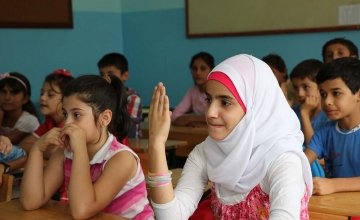
In Turkey: Supporting teachers to support their classrooms
Adnan is one such teacher, who worked for 26 years in his hometown in Syria until the conflict forced him to flee to Turkey with his wife and three young children. Now, he teaches music and philosophy in a Concern-supported TEC in south-eastern Turkey, funded by the European Commission Children of Peace initiative. In addition to Adnan’s salary, this funding also provides teaching and learning materials, infrastructure repairs, and teaching support.
The trauma of conflict and displacement, combined with students’ extended periods of absence from school, has had a significant effect on the emotional wellbeing of the children. Adnan notes that aggressive behaviour is regularly visible in the classroom, highlighting a need for increased psychosocial support. “My main concern is that my children and all Syrian children can have access to school,” he says. Inside the classroom, with help from Concern’s Teacher Mentors, teachers like Adnan have developed techniques to manage the challenging behaviour presented by some of their students. Mentors visit classrooms to discuss challenges and solutions, as well as coach teachers in improved practice.
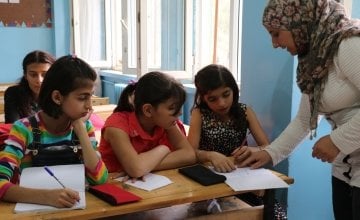
Education for Syrian refugee children: Your concern in action
In Turkey, we work in collaboration with the Turkish Ministry of National Education and local partners to alleviate financial constraints on families, as well as other barriers to education, so that Syrian children can access quality education that supports their learning, development and wellbeing.
In 2021, Concern’s Education programme helped over 3,100 school-aged Syrian boys and girls to enter the formal education system. Our support for school enrolment is complemented by social cohesion activities that bring Turkish and Syrian children together and psychosocial support that builds children’s resilience, confidence and sense of self-worth as they enter the Turkish formal education system.
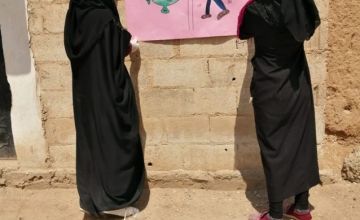
Our Building Tomorrow integrated emergency programmes provide education and livelihoods support for Syrians under temporary protection in four provinces in southeast Turkey, and reached over 13,500 people in 2020. The education element of the programme has been implemented at 30 public education centres (PECs) and 20 vocational and technical high schools (TVETs). Since language barriers impede progress, the programme provides Turkish language classes to 12,000 children at PECs, ages 6-13. It also seeks to improve access to formal educational opportunities for school-aged Syrians under temporary protection through outreach, learning-support programmes, and the provision of learning and psychosocial support materials.
Our education programmes extend into Syria as well. In northeast Syria, we give out-of-school and conflict-affected children access to quality primary-level education, providing support in both non-formal education centres and formal schools. In 2020, this effort reached nearly 6,000 students. Despite the challenges posed by COVID-19, we were still able to expand our programme, opening two new non-formal education centres (bringing the total to six), rehabilitating seven primary schools, and beginning our first homework support component in formal schools to help support pupil retention.
*Names have been changed for security purposes


